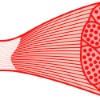Skeletal Muscle is a peer-reviewed, open access, online journal that publishes articles investigating molecular mechanisms underlying the biology of skeletal muscle. A wide range of skeletal muscle biology is included: development, metabolism, the regulation of mass and function, aging, degeneration, dystrophy and regeneration. The emphasis is on understanding adult skeletal muscle, its maintenance, and its interactions with non-muscle cell types and regulatory modulators.
Call for Papers: Skeletal Muscle Fiber Heterogeneity
Skeletal Muscle is calling for submissions to our new Collection on Skeletal Muscle Fiber Heterogeneity. This Collection aims to explore the diverse facets of muscle fiber heterogeneity.
Call for Papers: In Vitro Models of Skeletal Muscle
Skeletal Muscle is calling for submissions to our new Collection on In Vitro Models of Skeletal Muscle. This Collection aims to showcase advancements in in vitro modeling of skeletal muscle physiology and pathology.
Call for Papers: Gene Therapy in Skeletal Muscle and Neuromuscular Diseases
We are proud to announce a new Collection focusing on gene therapies in skeletal muscle and neuromuscular diseases. We welcome articles exploring various aspects of gene therapy for these diseases, and highlighting measures to overcome the challenges related to gene therapies.
David J. Glass elected to the U.S. National Academy of Sciences
Congratulations to David J. Glass, co-founder of Skeletal Muscle, who was recently elected to the U.S. National Academy of Sciences in recognition of his exceptional contributions elucidating key molecules and signaling pathways involved in the control of skeletal muscle atrophy and hypertrophy.
Editorial co-written by Se-Jin Lee, Bruce Spiegelman & Kevin Campbell
Featured Article: N-terminal titin fragment: a non-invasive, pharmacodynamic biomarker for microdystrophin efficacy
Back to topSkeletal Muscle is excited to feature the recently published paper: "N-terminal titin fragment: a non-invasive, pharmacodynamic biomarker for microdystrophin efficacy" by Solid Biosciences. This work investigates the use of non-invasive markers to assess the efficacy of microdystrophin gene therapy and to supplement traditional outcomes measures. The N-terminal fragment of titin is elevated in DMD biofluids but was reduced in conjunction with microdystrophin expression in the skeletal muscle and localization to the sarcolemma. Further, this reduction in N-terminal titin was sensitive to lower levels of expressed microdystrophin in the skeletal muscle when compared to serum CK. Biomarkers from non-invasive biofluids, like the N-terminal fragment of titin, have the potential to provide additional confidence in drug efficacy, to help drug developers reach decisions faster, and to reduce the burden of clinical trial participation for patients and their families. Image Created with Biorender.
Articles
-
-
ASM is a therapeutic target in dermatomyositis by regulating the differentiation of naive CD4 + T cells into Th17 and Treg subsets
-
Skeletal muscle vulnerability in a child with Pitt-Hopkins syndrome
-
David J. Glass elected to the U.S. National Academy of Sciences
-
Targeted expression of heme oxygenase-1 in satellite cells improves skeletal muscle pathology in dystrophic mice
-
The endogenous molecular clock orchestrates the temporal separation of substrate metabolism in skeletal muscle
-
Aberrant repair and fibrosis development in skeletal muscle
-
Idiopathic inflammatory myopathies: pathogenic mechanisms of muscle weakness
-
Regulation of skeletal muscle growth by the IGF1-Akt/PKB pathway: insights from genetic models
-
T-tubule biogenesis and triad formation in skeletal muscle and implication in human diseases
Featured blogs
-

Investigating the genetics behind muscular dystrophy in dogs
05 September 2017
-

-
Tackling ischemia to treat DMD
01 July 2014
Aims and scope
Editor quotes
Carmen Birchmeier, co-Editor- in-Chief
"Skeletal muscle provides a platform for work on basic mechanisms used during muscle development, regeneration disease and aging. I find the similarities and differences between developing and adult muscle stem cells particularly fascinating."
Markus A Rüegg, co-Editor-in-Chief
"Skeletal Muscle publishes influential mechanistic and methodological papers in the field and has become an important journal for my own research. I hope to further strengthen the journal´s coverage of mechanisms involved in the pathology of neuromuscular diseases."
David Glass, Founding Editor-in-Chief
"The goal of the journal is to understand how the skeletal muscle relevant cellular systems work, so that one might be able to improve human health and combat disease.”
Annual Journal Metrics
-
Citation Impact 2023
Journal Impact Factor: 5.3
5-year Journal Impact Factor: 5.0
Source Normalized Impact per Paper (SNIP): 1.140
SCImago Journal Rank (SJR): 1.856Speed 2023
Submission to first editorial decision (median days): 8
Submission to acceptance (median days): 149Usage 2023
Downloads: 483,918
Altmetric mentions: 338

